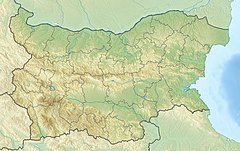| Iskar | |
|---|---|
 Iskar near Karlukovo | |
| Native name | Искър (Bulgarian) |
| Location | |
| Country | Bulgaria |
| Provinces | Sofia, Sofia City, Vratsa, Lovech, Pleven |
| Cities | Samokov, Sofia, Svoge, Mezdra |
| Physical characteristics | |
| Source | Damga Peak |
| • location | Rila Mountains, Sofia Province |
| • coordinates | 42°11′40″N 23°19′50″E / 42.19444°N 23.33056°E |
| • elevation | 2,500 m (8,200 ft) |
| Mouth | Danube River |
• location | north of Gigen, Pleven Province |
• coordinates | 43°43′56″N 24°26′29″E / 43.73222°N 24.44139°E |
• elevation | 25 m (82 ft) |
| Length | 368.0 km (228.7 mi)[1] |
| Basin size | 8,617 km2 (3,327 sq mi) |
| Discharge | |
| • average | 54 m3/s (1,900 cu ft/s) |
| Basin features | |
| Progression | Danube→ Black Sea |
 | |
The Iskar (Bulgarian: Искър, pronounced [ˈiskɐr]; Latin: Oescus) is a right tributary of the Danube. With a length of 368 km, it is the longest river that runs entirely within Bulgaria.[2] Originating as three forks in Balkan's highest mountain range Rila, the Iskar flows in a northern direction until its confluence with the Danube. As it flows northwards it fuels the largest artificial lake in the country, the Iskar Reservoir, forms the divide between the Vitosha and Plana Mountains in the west and the Sredna Gora mountain range in the east before entering the Sofia Valley, which contains the nation's capital Sofia. From there the Iskar runs through the Balkan Mountains, forming the spectacular 84 km long Iskar Gorge. As it crosses the mountains, its water course turns in a north-eastern direction at Lakatnik. North of the Balkan Mountains, the river crosses the Danubian Plain and finally flows into the Danube between the villages of Baykal and Gigen. Geologically, Iskar is the oldest river in the Balkan Peninsula.
Its watershed drains 8,617 km2[2] in the provinces of Sofia, Sofia City, Vratsa, Lovech and Pleven. The Iskar flows through nine towns and numerous villages. The Iskar river basin is home to more than 50 species of fish, including Cottus haemusi that is endemic to the upper Iskar and Vit drainages.
The Iskar has a significant economic importance, providing water for the needs of the capital and a number of manufacturing plants. It waters are also utilised for irrigation and electrical energy generation, while the scenic gorges and rock formations throughout its course provide excellent conditions for recreation. Although the Iskar is not navigable its valley is very important for transportation, especially along the Iskar Gorge, which is one of the only three passes in the Balkan Mountains crossed by a railway.
- ^ "Iskar River". Panacorp Wonderland Travel. 2015. Retrieved 6 August 2020.
- ^ a b Statistical Yearbook 2017, National Statistical Institute (Bulgaria), p. 17
